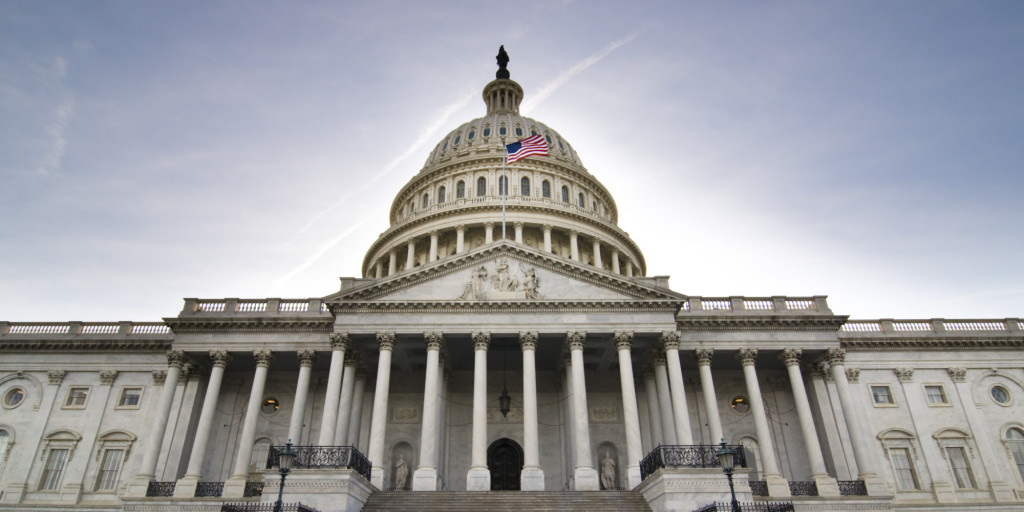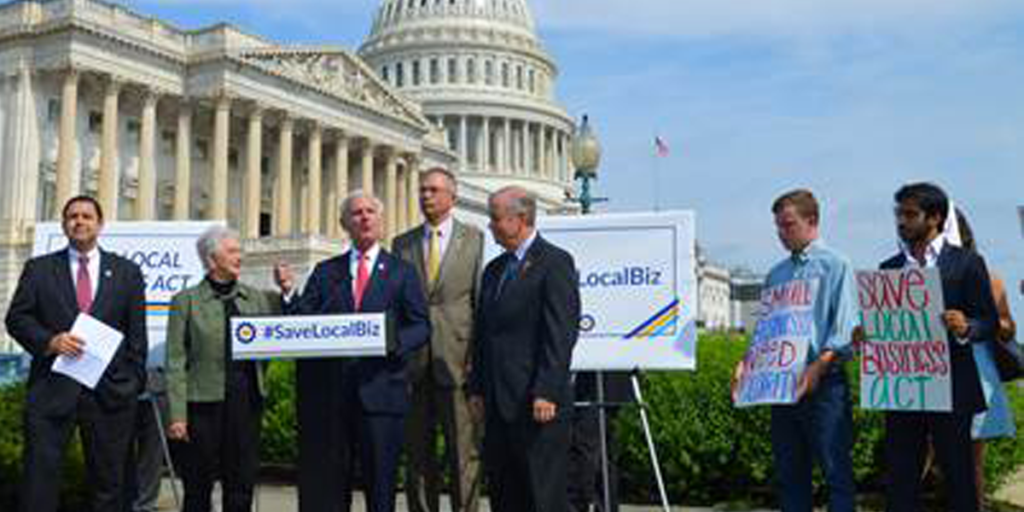Bradley Byrne: Getting results for locally owned businesses

When I ran for Congress, I made clear that I wanted to be a workhorse, not a showhorse. That means my focus has been on actually getting results instead of just talking about problems. We were able to get a big result last week when the House passed my bill, the Save Local Business Act. The legislation came about after I heard concerns from multiple locally owned businesses. I’ve sat down in local restaurants and heard firsthand from hardworking men and women who took time away from their business to travel to Washington and urge Congress to address issues caused by something known as the “joint employer” standard. So, what is the issue exactly? For decades, there was a commonsense legal test that determined when two or more separate businesses could be considered joint employers and held jointly responsible for the same group of employees. Employers had to share “direct” and “immediate” control over essential terms and conditions of employment. As a former labor and employment attorney who practiced in this area for decades, I can assure you that this was the standard that everyone knew and appreciated. Unfortunately, in 2015, the activist National Labor Relations Board (NLRB) issued a ruling in Browning-Ferris Industries that upended this cornerstone of federal labor law and created a vague and unworkable new joint employer policy. Making matters even worse and more complicated, federal agencies then incorporated the new standard in their regulatory agenda. Under this new standard, two independent businesses can be considered joint employers if they make a business agreement that “indirectly” or “potentially” impacts their employees. Just think about the uncertainty and ambiguity this standard could cause. It’s hard enough for labor attorneys to even agree on what exactly it means to have “indirect” or “potential” control over an employee. Imagine how confusing it is for Main Street businesses to understand and follow. Bob Omainsky, the owner of Wintzell’s Oyster House, had this to say about the confusion caused by the new joint-employer standard: “If we hire an outside landscaping company to keep our lawns lush, I could be considered a joint employer if I show the landscapers where to mow. Or, if I contract a food supplier for certain ingredients, I could become part of a lawsuit if one of their workers complains about overtime pay. The uncertainty is nothing more than governmental overreach that is crippling eateries like Wintzell’s and discouraging growth throughout the restaurant industry.” Workers shouldn’t have to wonder who their employer is. They deserve better than a vague and confusing rule that the American Action Forum found threatens 1.7 million jobs. Even the Progressive Policy Institute issued a statement saying that the expanded standard “may do more harm than good.” My legislation earned support from both Republicans and Democrats when it passed the House last week. This is a bipartisan issue because it isn’t about politics. Instead, it’s about saving jobs and supporting locally owned businesses. Despite scare tactics from Big Labor bosses and their trial lawyer buddies, I want to make one thing perfectly clear: this legislation does not remove a single worker protection. All worker protections provided by the National Labor Relations Act, the Fair Labor Standards Act, and the Equal Pay Act remain unchanged and are still available. Ultimately, my bill is about providing clarity to workers and job creators. It is about protecting the rights of workers and ensuring employers have clarity on their responsibilities to employees. I was proud to see the bill pass out of the House last week, and I am going to continue focusing on getting results for the people of Southwest Alabama. • • • Bradley Byrne is a member of U.S. Congress representing Alabama’s 1st Congressional District.
House passes Bradley Byrne’s Save Local Business Act

The U.S. House of Representation on Tuesday passed the Save Local Business Act, a bill that rolls back a vague and expansive Obama-era National Labor Relations Board’s (NLRB) ruling that made businesses potentially liable for labor law violations committed by their subcontractors providing certainty for local businesses and their employees. Introduced in July by Alabama 1st District U.S. Rep. Bradley Byrne, who serves as the chairman of the House Workforce Protections Subcommittee, the bill passed by a bipartisan vote of 242 to 181. “For a few years now, I’ve visited local businesses and heard concerns about how the joint employer scheme creates confusion and uncertainty for workers and job creators. With this vote today, the House has shown we are listening to those concerns and doubling down on our commitment to protecting local businesses and their employees,” said Byrne. “As someone who practiced law in this field for years, I have no doubt today’s vote will make things easier for small businesses throughout the country and help clear the air of uncertainty. I want to thank all of my colleagues for their support in passing this critical legislation, and I am especially pleased the bill passed with votes from both sides of the aisle.” Byrne’s bill amends the National Labor Relations Act and the Fair Labor Standards Act to clarify that two or more employers must have “actual, direct, and immediate” control over employees to be considered joint employers. “Today’s House vote is a victory for America’s workers and local businesses that need relief from the NLRB’s extreme and unworkable joint employer scheme. We want to make it easier, not harder, for hardworking men and women to own a business and achieve the American Dream, and that’s exactly what this commonsense bill is all about.,” North Carolina-Republican and House Education and the Workforce Committee Chairwoman Virginia Foxx said of the bill’s passage. “I want to thank Representative Byrne for championing this proposal, as well as all the members of the committee for their hard work and passion that went into advancing this important legislation.” The bill earned support from multiple national organizations, including the Coalition to Save Local Business, the U.S. Chamber of Commerce, the International Franchise Association, the National Taxpayers Union, the National Retail Federation, the Workplace Fairness Institute, the American Hotel and Lodging Association, the National Restaurant Association, and more. Byrne delivered a speech on the House floor in support of his legislation. Watch: A transcript of his speech can be found below. Mr. Speaker, today is a big day. Today is an opportunity for the House to stand up for our nation’s workers and to protect the small, local businesses which form the backbone of the American economy. Today is about restoring decades’ old labor law. Ultimately today is about giving clarity to workers and job creators all across our country. I heard from my friends across the aisle that someone can be an employee without there being an employer. I call that the immaculately conceived employee. There is no such thing under the law nor has there ever been. This bill does not change the definition of employer. It simply takes the definition of joint employer back to the way it was a few years ago. It’s a shame we even have to have this bill. But the activist National Labor Relations Board in 2015 issued a decision that fundamentally up-ended labor law as we knew it. This change didn’t come through the democratically elected Congress but instead from a panel of unelected bureaucrats. The NLRB’s decision has caused deep uncertainty among job creators. For workers, they are left to wonder who their boss really is. That is an incredibly confusing situation to be in. Under the new joint employer standard, what does it mean to have ‘indirect’ or ‘potential’ control over an employee? I practiced labor and employment law for decades, and I do not know what that means so I can only imagine the confusion Main Street businesses have faced due to this standard. Currently there are at least nine different legal tests nationwide to determine joint employer status under the Fair Labor Standards Act and more to come. This patchwork of standards creates regulatory uncertainty, especially for job creators doing business in multiple states. So despite what some on the other side want to believe, this is not an abstract issue. I have visited numerous local businesses in my district, and I know they are very worried about this scheme. I’ve heard from workers who want to remain an employee of a locally owned business with an owner who knows them instead of becoming just another employee in some large corporation. Clearly, I’m not the only one who heard these concerns. This legislation is co-sponsored by 123 of my colleagues, including members from both sides of the aisle. This is a bipartisan issue because it isn’t about politics. Instead, it’s about saving jobs and supporting locally owned businesses. And let me make something crystal clear: this bill does not remove a single protection for today’s workforce. Despite the scare tactics being used by Big Labor bosses and their trial lawyer friends, the same important protections exist under this legislation and any irresponsible employer can be held accountable. So, Mr. Speaker, I urge all of my colleagues to take the side of our locally owned businesses, to take the side of our small business job creators, and to take the side of America’s workers. Let’s stand end the confusion, and let’s pass the Save Local Business Act. I yield back my time.
Bob Omainsky: Alabama’s Bradley Byrne champions critical joint employer fix

In the South, we love football, family, and food — especially here in Alabama where we have one of the most decorated football teams in the country, family gatherings are our favorite time of the week, and our food is tasty and soulful. There is no better way to bring football, family, and food together than at your favorite local restaurant. Our restaurants are as spirited and rich as our traditions. Some have been in families and communities for generations while others have developed from new and fresh ideas. But one thing that each has in common is the vital role they play in our economy. Restaurants contribute to job creation and economic growth while providing essential workforce development opportunities. They’re where employees build skills that shape their future success. They serve as pillars within their communities and are a driving force not just for Alabama’s economy, but for the nation’s economy. Alabama has 7,845 eating and drinking locations that employ 185,300 people and contribute $8.1 billion in economic output. I find it troubling that any national policy would aim to hinder, or even eliminate, the industry’s growth potential. Unfortunately, a National Labor Relations Board (NLRB) decision to expand the joint employer definition did just that in 2015. Joint employer is the standard by which two or more businesses share control of an employee. Before 2015, business owners had a clear understanding of when they might be liable for another company’s employment actions. The long-established standard held that you must have “direct” and “immediate” control over another company’s workers. Under the new rule, it’s not as simple. Today’s definition is drastically-expanded, putting restaurants at legal risk with only the vaguely defined “indirect” or “potential” control over another company’s employees. Neither attorneys nor human resources professionals can agree on the scope of these terms — leaving business owners with little recourse but to buy more expensive and protective insurance and to reevaluate many of their business relationships altogether. Take, for instance, my nearly 80-year-old business, Wintzell’s Oyster House. If we hire an outside landscaping company to keep our lawns lush, I could be considered a joint employer if I show the landscapers where to mow. Or, if I contract a food supplier for certain ingredients, I could become part of a lawsuit if one of their workers complains about overtime pay. The uncertainty is nothing more than governmental overreach that is crippling eateries like Wintzell’s and discouraging growth throughout the restaurant industry. Thankfully, Alabama’s own Rep. Bradley Byrne has introduced bipartisan legislation that aims to roll back this confusing joint employer ruling and provide some much-needed clarity for millions of restaurants across America. Rep. Byrne and the more than 50 co-sponsors of H.R. 3441, the Save Local Business Act, understand the importance of having federal policies that help businesses grow and thrive for the good of our entire workforce. On behalf of the 1,117 restaurants in Alabama’s 1st District that employ 22,259 men and women, I would like to thank Rep. Byrne for his continued leadership and his effort to clarify the joint employer issue. This is a critical measure because after all, a stable employer environment will only make our restaurants that much better at bringing together football, family, and food for generations to come. ••• Bob Omainsky is owner-operator of Wintzell’s Oyster House, with three locations in the Mobile, Ala. area.
Bradley Byrne: Cutting the noise

There has been a lot of noise coming out of Washington and in the national news media. If you listen to all the noise, you would think the only thing happening in our nation’s capital is staffing drama at the White House and an ongoing Russia investigation. Those topics consume the national headlines day in and day out. Sadly, that narrative does not match the reality of what is happening in the House of Representatives. In fact, we are getting our work done and following through on our promises. I bet you would be surprised to know that already this year the House has passed over 295 bills. I doubt that is something you have heard from the national news media. To help illustrate how much we are getting done in the House, let’s consider just what happened this past week. Most notably, the House passed the Make America Secure Appropriations Act, a major national security funding bill. The bill provides funding for the military, veterans, border security, and much more. Having state-of-the-art facilities and resources is vital to the success of our military. To help repair dilapidated and aging military infrastructure, the bill provides a 25% increase in military construction funding. Supporting our service-members and their families is also a high priority in the bill, as it provides for the largest military pay raise in eight years. The bill allocates the highest level of funding for the Department of Veterans Affairs in our nation’s history. This will help cut down on the claims backlog and move forward with a new electronic medical health record system. The American people sent a strong message last November that they wanted a wall securing our southern border. This bill will begin this process by providing over $1.5 billion requested by President Trump for physical barrier construction along the Southern border. This is a major breakthrough in our efforts to secure the border. We also passed bills to reauthorize our nation’s intelligence programs and to provide emergency funding for the VA, including the VA’s Choice program. Both of these bills passed the House with broad bipartisan support. On Thursday, I introduced the Save Local Business Act, which rolls back the extreme joint employer scheme to protect American jobs and entrepreneurship. My bill is all about making sure federal labor policies focus on benefiting workers and helping small businesses grow instead of creating barriers that limit opportunity. I am pleased it is already earning bipartisan support. Also last week, a major announcement was made regarding the future of tax reform. House, Senate, and White House leaders issued a joint statement outlining the key principles of tax reforming and making clear that simplifying the tax code is a shared priority. On the local front, the House-passed national security bill includes important funding for the Littoral Combat Ship (LCS) program, which is great news for the over 4,000 men and women who work at the Austal shipyard in Mobile. I also joined with a number of my Gulf Coast colleagues in introducing a bill on Friday to help permanently solve the Red Snapper issue in the Gulf of Mexico. Introducing this legislation is an important first step in advancing a solution to ensure all our fishermen have access to Red Snapper in the Gulf. So, I encourage you to make every effort to cut through the noise and focus on what the House is actually getting done. To help you get all the facts on what the House is accomplishing, I encourage you to check out DidYouKnow.gop. This website highlights the fact that the House is getting our job done, as we promised the American people. • • • Bradley Byrne is a member of U.S. Congress representing Alabama’s 1st Congressional District.
Bradley Byrne introduces bill to protect businesses, reverse controversial labor rule

Alabama 1st District U.S. Rep. Bradley Byrne introduced legislation Thursday to protect America’s local businesses by restoring the commonsense definition of what it means to be an employer, protecting companies from being held liable for labor law violations made by their subcontractors. H.R. 3441: The Save Local Business Act, endeavors to undo an Obama-era standard in which the National Labor Relations Board (NLRB) expanded the joint employer standard and thus increased businesses’ exposure to lawsuits and unionization efforts. Byrne’s bill would amend the National Labor Relations Act and the Fair Labor Standards Act to clarify that two or more employers must have “actual, direct, and immediate” control over employees to be considered joint employers. It would: Roll back a convoluted joint employer scheme that threatens job creation and undermines the American Dream. Restore a commonsense definition of employer to provide certainty and stability for workers and employers. Protect workers and local employers from future overreach by unelected bureaucrats and activist judges. “Federal labor policies should be focused on benefiting workers and helping small businesses grow instead of creating barriers that limit opportunity. Also important, Congress – not unelected federal bureaucrats – should set our nation’s labor policies through statute instead of executive fiat,” said Byrne. “Under this bipartisan legislation, workers, and the businesses they work for, will be given much needed clarity and certainty. I am especially pleased our legislation has earned support from both sides of the aisle, and I am committed to continuing to build momentum as the bill moves through the legislative process.” The bill has bipartisan support from 29 co-sponsors, including House Education and the Workforce Committee Chairwoman, North Carolina Republican Rep. Virginia Foxx. “Right now, local employers across the country face an enormous amount of uncertainty because of a vague and confusing joint employer standard,” commented Foxx. “Congress cannot sit on the sidelines while this harmful scheme threatens to destroy jobs and make it harder for entrepreneurs to achieve the American Dream of owning a business. I commend Congressman Byrne for his leadership in this bipartisan effort to protect jobs and the spirit of entrepreneurship in local communities.”


